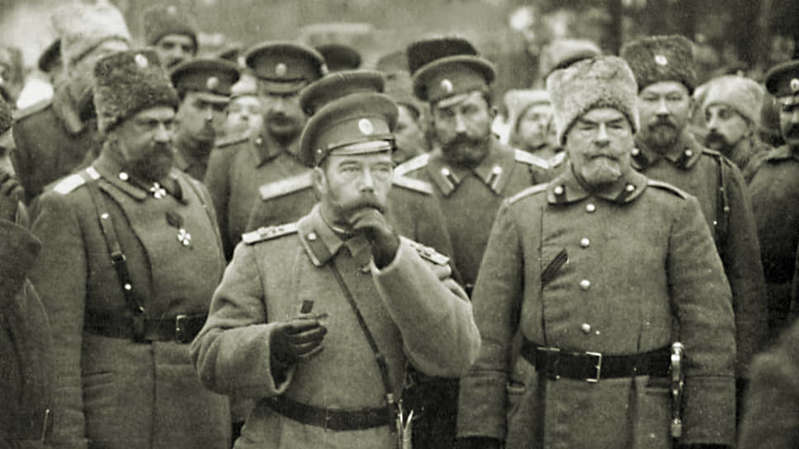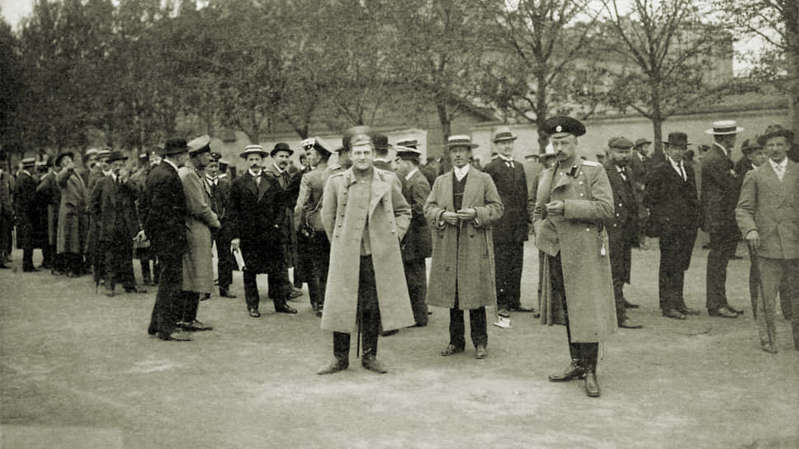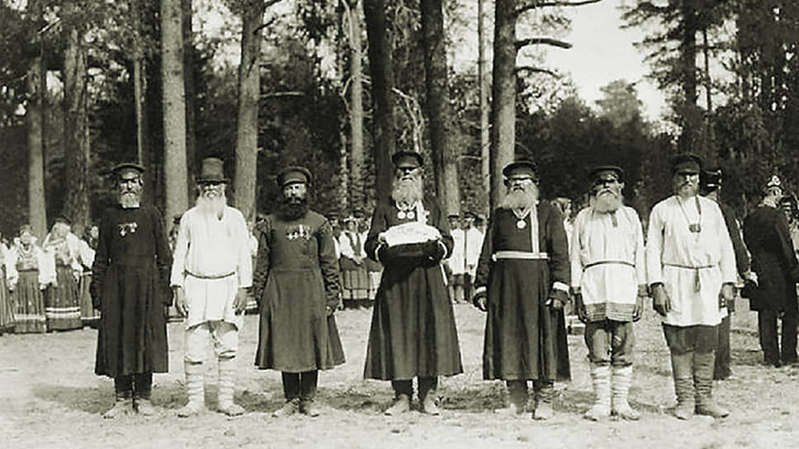
“At the present time, this question takes on special significance when the labors of the Royal service are compounded by the assumption of the High Command by Your Imperial Majesty.”
What the authorities lacked to maintain power
105 years ago, on May 3, 1916, the Council of Ministers asked and soon received permission from Nicholas II not to submit for the highest approval a considerable part of the decisions of the heads of departments, so as not to distract the emperor from the leadership of the belligerent army. Although at the meeting of governors that took place on the same days, much was said about the already observed inconsistency in the actions of all branches of government, the aggravating the situation with a critical rise in prices and the consequences of providing state aid, in fact, to only one category of the population.
“For the Highest Resolution and Goodwill”
The idea to curtail the powers of the head of state came up shortly after a plausible pretext appeared for this. On August 23, 1915, after a series of successful actions by the enemy troops, Nicholas II removed Grand Duke Nikolai Nikolaevich from command of the Russian army and himself became the Supreme Commander-in-Chief.
In the course of the subsequent change in the composition of ministers, one of the key posts in the state – the head of the Ministry of Internal Affairs, to whom governors, the police and the corps of gendarmes were subordinate, at the insistence of the all-powerful “tsarist elder” G. Rasputin received secret adviser A. N. Khvostov. And it was he who had the idea to free the monarch, who was busy with the affairs of the fronts, from unnecessary worries about the problems of the rear, while significantly expanding his own powers of power.

“The work of local institutions, which has significantly increased with the war, with a weakening of the personnel by conscriptions by almost three quarters, is undoubtedly overwhelming.”
On the surface, it was about matters that were not too significant – for example, about changing the plans of cities, leaving the state forest to departments and individuals, etc.
But this stream of decisions was the day-to-day administration of the state.
Therefore, all proposals of ministers and heads of departments on such issues, which did not rise in importance to the level of laws and therefore were not subject to consideration by the State Duma, were approved by the emperor.
The changes planned by the Minister of Internal Affairs boiled down to giving him the right to continue to make decisions on behalf of Nicholas II on more important of these issues. For the same affairs that previously always required the royal approval, but were considered less significant, Khvostov wanted to make decisions without reference to the tsar.
He did not take into account only the fact that his attempt would cause a sharp rejection of other ministers, who, with the help of proven bureaucratic methods, began to interfere with the plans of the head of the Ministry of Internal Affairs. Khvostov's report on his new powers was to be considered by the Council of Ministers before being presented to the emperor. But instead of approving the document, members of the government announced on December 15, 1915 that the proposed measures were “of common importance for all departments.” Therefore, they decided to form a special meeting of senior members of the interested ministries and main departments for their detailed discussion. The debate continued until Khvostov, who fell out of favor, lost his post.

“The well-being of the peasant population is in unprecedented conditions”
On March 3, 1916, the duties of the Minister of Internal Affairs were assigned concurrently to the head of the government, the chamberlain B.V. Sturmer. And already on March 29, 1916, the Council of Ministers proposed to the emperor to reduce the number of cases proposed “for the Highest resolution and goodwill.” And he received permission to draw up a list of issues from which the monarch was going to be released. On May 3, 1916, the prepared list was approved at a government meeting.

“The governors cited a number of cases that clearly characterize the gendarme power in the province, as a state within a state”
In principle, there was nothing catastrophic in expanding the powers of the heads of departments. But not in the situation prevailing in the country by that time.
“To detain and register” single women “
Since the beginning of the First World War, the fierce rivalry between departments for rights and powers that has existed for centuries has become significantly aggravated. And the heads of 15 central provinces of Russia, who were invited in early May 1916 by order of BV Sturmer to a meeting with the highest officials of the Ministry of Internal Affairs, spoke about this.
The governors complained that tax inspectors and other officials of the Ministry of Finance in their subordinate territories do not want to work in concert with the local authorities and have “a certain oppositional coloring.” But, in essence, the Ministry of Internal Affairs could not take any effective measures, and in the journal (minutes) of the “Meeting of invited governors” they wrote:
“The meeting accepted the wish to inform the Minister of Finance about this.”
There were no less problems with the Ministry of Agriculture, which, in wartime, was empowered to cancel the orders of local authorities regarding food and fuel. But many governors knew almost nothing about the instructions of this department, or about the actions of its delegates. However, as well as about the orders of other ministries.
“The meeting,” said his journal, “recognized the urgent need to get in touch with all departments about informing the governors of all circulars issued by these departments, since, being legally responsible for the life of the province, the governor is constantly ignorant of the general undertakings of outside departments. resulting in a complete inconsistency of action. “
The actions of the Ministry of Internal Affairs, which controlled them, aroused no less criticism from the governors. In the event of friction with various organizations, prominent persons who were their leaders or members who had connections in the ministry went to Petrograd and easily sought the cancellation of the decisions of the governors.
However, the most serious contradictions existed between the civilian departments and the generals, who considered themselves entitled to give orders to everyone and everything.
Moreover, as noted at the meeting of the invited governors, the orders of the military were not well thought out:
“The governors do not allow the slightest friction to arise and are steadily working towards reconciling with life the orders of the military authorities that go against it. But at the same time, the meeting found it necessary to note a number of extremely unsuccessful demands of the military command staff, which adversely affect not only the work of the ministry's bodies, but entail the most dire consequences for the way of life of the population of the empire. “
Specific examples were also given:
“For example, the headquarters of the Northern Front gave orders to several, sometimes rather remote, provinces (Vladimirskaya) to deliver workers to land work to prepare trenches. In view of the distance, the governor, without delaying the execution, protested and received an explanation from the General Staff that he should not carry out this order; but it was too late, since the workers had already been dispatched. They were returned pretty soon, but, as in the rest of the provinces, they were hungry, in tattered clothes, having worked and getting paid for one day out of three; on the rest of the days they were not given work, for those days they were not paid or fed. Some of them, apparently protesters, were subjected to corporal punishment. “
The governors spoke about other unacceptable orders of the military:
“The requisition of private apartments causes a lot of complaints, and along with this, specially military premises are empty.
In the Tver province, an order was issued “to take away all the boots.”
Finally, the same headquarters of the Minsk District issued an order to detain and register “single women” and those who resist subjecting them to corporal punishment; explainably, this was the emergence in the West of a society of women sympathetic to Germany, with the aim of infecting the Russian military commanders with Lues. “
The most odious orders of the military, as the governors noted, after negotiations with the highest army ranks, they still managed to be canceled. But the main complaint against the War Ministry was its contribution to the rise in the cost of living in the country:
“The requisitions of livestock are carried out haphazardly: some areas are left completely without livestock, and prices are soaring.”
And the existence of a dual power on the railways, where the railroad and military commanders were in command at the same time, led to a collapse of the supply of cities and an unrestrained rise in prices. Moreover, both natural – due to a shortage of products and goods, and artificial – caused by the boundless greed of merchants.
However, the government looked at what was happening with surprising composure. After all, the largest part of the population was, in the opinion of the capital's officials, reliably protected from falling living standards. And there was a great deal of truth in this.
“From the exorbitant rise in price of life”
The journal of the meeting stated:
“The prohibition of alcohol, the rations received by the families of the conscripts, and the well-paid work of the remaining population created unprecedented material prosperity in the peasant population of the empire. In accordance with the general security and having in his hands the production of basic necessities, the peasant suffers less than others from the common scourge – high prices; hence – the correct receipt of duties and, in general, full satisfaction on the ground. “
A similar picture, the governors said, was observed in factories and factories, where the owners decided to compensate workers for the rise in prices. And as an example, the Vladimir-Yaroslavl industrial region was cited:
“Here,” the magazine said, “the centers of the factory industry are the Karzinkinskaya and Orekhovo-Zuevskaya Morozovskaya manufactories.
Both of these enormous enterprises are doing excellently, with the complete improvement of the workers, and the high cost is compensated for by the principle of additional payment by the owners of the enterprise for the entire amount by which the essential goods and products have become more expensive.
So the prices for them for the workers are at the market level of July 1914. At the head of the factory inspection are persons of excellent mental qualities, relations with workers are good, and there are no economic strikes, but they do happen on a political basis. “
But these examples were rather an exception to the general rule. In many other industrial areas, the fall in living standards created an explosive situation.
At the meeting, it was noted that not only workers, but also ordinary people in cities suffering from “the exorbitant rise in the cost of living”, in order to somehow compensate for the rise in prices, unite in cooperatives that buy products for them in bulk, much cheaper than in shops and stores. However, the governors saw this as a threat to the existing system:
“The extraordinary growth of cooperatives, which is observed everywhere, is explained by the hopes of the layman to achieve economic benefits … Further, commercial tasks recede into the background, and educational and spiritual goals are put forward in the form of legalized propaganda of anti-state principles.”
There was no need to wait for help from city governments in the fight against high prices, and, consequently, against anti-government sentiments, as the governors believed. The backbone of the elective were, as a rule, merchants. And the meeting stated:
“The city government, being wholly absorbed in personal interest, is inert and indifferent to public affairs, not missing an opportunity to benefit.”
And when the provincial authorities tried to curb the merchants who profit from their compatriots, high-ranking officials from the capital stood up in their defense.
The governors also said that the rise in prices deprives them of the ability to manage the situation:
“The state of affairs becomes especially serious if we take into account that the only officials of the peasant administration on whom the government can rely – the zemstvo bosses – are in terrible conditions of existence: the lack of funds and the high cost of living make it impossible for them to have sufficient communication and supervision over volost and rural administration, the composition of which decisively influences the peasant masses. Meanwhile, it is difficult to expect from the zemstvo chief to travel around the area, when all the time one of them has to manage three areas for conscription of the rest into the active army. At the same time, travels are so expensive that the zemstvo chiefs are literally living in poverty, not from local landowners.
Much was also said at the meeting that the local authorities would be powerless in the event of disorder. And again, because of the high cost:
“Leaving aside the abnormal situation of the general police, which urgently requires reforms according to the already developed assumptions, the meeting stopped at the threatening state of the police guard. The latter is the only real force in the hands of the governor in those cases when all other measures have been exhausted and are insufficient. Meanwhile, at present, the guards are held in service by the only exemption from conscription, since the material conditions of their service put them in an extreme position until they can have hot food only every other day. “
No one doubted that an explosion of discontent could be expected even among materially prosperous peasants.
“I sincerely thank the governors”
The governors claimed that they were receiving information that there was a single center for anti-government agitation in the country. And the pain points, with the help of which it was possible to cause sharp dissatisfaction with the existing government, were in abundance. Peasants, for example, from the time of the abolition of serfdom, remained dissatisfied with the size of the land allotments allocated to them.
“Of course,” said the journal of the conference, “propaganda is being conducted on the most sensitive aspects of the desires of the Russian peasant — the hope for a free land donation.”
But, among other things, eternal departmental disunity prevented predicting and preventing outbursts of discontent:
“The governors cited a number of cases that clearly characterize the gendarme power in the province, as a state within a state; at the same time, sometimes secret information is hidden from the governors and, at the same time, along the way, is communicated to all the police officers; the result of the ignorance of the governor is inconsistency of actions. “
The heads of the provinces asked BV Sturmer, who presided over the meeting, to pay close attention to the high cost, as the most explosive factor, offered their own options for combating it, insisted that it was necessary to organize the delivery of civilian goods by rail. The head of government was told about many other problems.
But in his most submissive note to Nicholas II on the results of the conference on May 8, 1916, everything was submitted in a much softened form. At the same time, the main problem of the rear regions of the country – the rise in high prices – was mentioned only in passing. After all, the bulk of the population – the peasants – it did not concern. But in general, everything looked as if the monarch had nothing to worry about, and the governors, together with the Ministry of Internal Affairs, would cope with any problems.
“I dare to most fully report to Your Majesty,” wrote Sturmer, “that the governors of 15 provinces who gathered for the first convocation turned to me with a petition to cast down at your feet, Great Sovereign, inspiring their feelings of boundless devotion to the Throne and readiness, despite all the hardships of the working conditions of the time, carry your labor, not sparing strength and life itself for the good of the homeland and the greater glory of Your Majesty. “
The moved emperor on May 12, 1916, wrote on Sturmer's note:
“I sincerely thank the governors. I hope that everything reported here will be taken into serious consideration by all departments. “
The Council of Ministers realized that it was high time to submit to the emperor a list of issues that no longer required the highest approval, and on May 31, 1916, Nicholas II agreed to an increase in the independence of the departments, which inevitably led to an increase in the inconsistency in their activities.
Less than nine months remained before the collapse of the monarchical system.
Evgeny Zhirnov
Read also:

